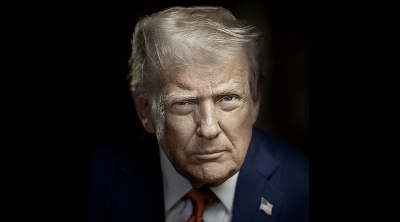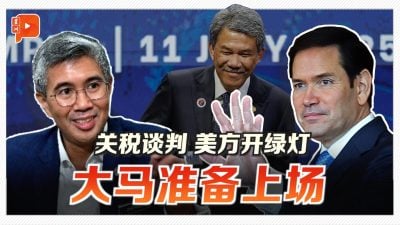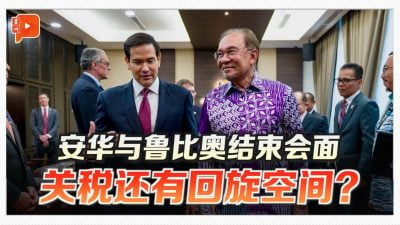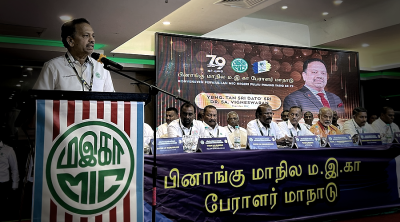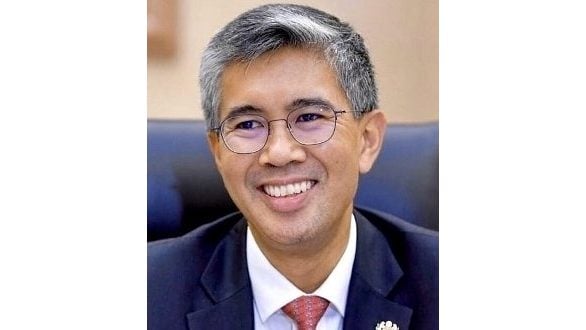
Whiplashed! That is how most of us following the news about Donald Trump’s reciprocal tariffs feel!
First came the announcement on “Liberation Day” reciprocal tariffs, which roiled markets and wiped out trillions of value from bourses globally.
Then came the 90-day pause on those tariffs, where all rates for all countries (except China) were levelled at 10 percent, whipsawing markets yet again.
When two economic titans clash, global trade and economic growth will likewise be impacted.
Retaliatory US-China tariffs are damaging to the world, including Malaysia—a small, open, trading nation.
Still, this is no time to panic. In fact, the Madani government’s response in these past 10 days has been calm and level-headed, prioritizing negotiation, not retaliation, while we continue to closely monitor the situation.
This sense of foreboding—premised on the unknown—is disturbingly familiar.
For me, this is like weathering the economic storm on repeat, like my finance ministership during the pandemic years. Except this time the “virality of global panic” has been caused by a “pathogen” called US tariffs, which “mutate” every few days and fly in the face of a rules-based world order.
How can we move forward? Allow me to offer three suggestions.
First, this uncertainty seems to be the only certainty for now.
MITI and its agencies, together with other entities like Bank Negara, are still quantifying the full potential impact, but no matter what, Malaysia must be realistic and mentally prepare for slower economic growth and job losses.
The government will, of course, proactively act to protect our national interests, which also means protecting both workers and businesses.
While we can take exception at how the rates were calculated, the fact is that Americans have turned against free trade, as a July 2024 Pew Research Centre survey found that 59 percent of Americans polled felt that the US lost more than it gained from increased trade with other countries.
The Biden administration not only retained Trump’s first-term China tariffs but also hit Malaysia, Cambodia, Thailand and Vietnam with tariffs on our solar panels.
The hard truth is that Trump is simply reflecting the will of the American people, and we will have to adjust to it.
Second, despite all this, Malaysia has resolved to continue engaging with the US.
So, too, ASEAN, as agreed by the ASEAN Economic Ministers during a Special Meeting I chaired on 10 April.
Washington will find both Malaysia and ASEAN willing to negotiate and find win-win solutions.
In fact, the Madani government had, upon taking office back in 2022, already identified geopolitical risk as a potential challenge to our economy.
We have done and are doing—including the various economic reform plans and numerous international trade missions—are to prepare us for shocks like this.
The National Geo-economic Command Centre (NGCC) has been activated under the Prime Minister to monitor conditions in real time.
MITI has also set up a taskforce to engage with all stakeholders, especially those in the impacted sectors, to determine strategies to mitigate the pain.
Existing agreements with the US like the Trade and Investment Framework Agreement (TIFA) and the Technology Protection Agreement (TPA) will help address some of the issues in the Malaysia-US trading relationship.
Another thing we can and must do is diversify and deepen our markets.
We have been adroit in seeking new markets in the Middle East and Latin America.
I have, however, repeatedly said that there is a need to boost intra-ASEAN trade.
We are addressing this by upgrading the ASEAN Trade in Goods Agreement (ATIGA) during our Chairmanship year.
In terms of trade with key partners, there will also be reviews of the ASEAN China FTA (ACFTA), and the ASEAN-India Trade in Goods Agreement (AITIGA).
We must also more fully utilize our existing agreements like the Regional Comprehensive Economic Partnership (RCEP) and the Comprehensive and Progressive Agreement for Trans-Pacific Partnership (CPTPP).
The RCEP includes ASEAN plus China, Japan and Korea—a useful means to boost trade with other countries.
Malaysia and many ASEAN countries are also CPTPP members.
Enlarging the membership base of both CPTPP and RCEP can likewise boost trading opportunities.
Moreover, ASEAN should also pursue cooperation with other regional blocs, such as the Gulf Cooperation Council (GCC).
As ASEAN’s top foreign investment (FI) and second-largest trading partner, ASEAN has collectively refrained from retaliatory tariffs not only because we believe they are self-defeating but also because ASEAN believes multilateralism is still the best way forward for the world.
This region should draw comfort from the fact that post-Liberation Day announcement, our ASEAN leaders chose to reach out to each other rather than draw inward.
The AEM Joint Statement reflects this solidarity by affirming that ASEAN, “will continue to work together more closely, with greater unity and solidarity and remain committed to ASEAN’s rule-based trade.”
The tariffs will test ASEAN’s unity and neutrality, but they could also truly strengthen our unique brand of regional integration, while giving the bloc an urgency and realism that critics say it lacks.
I believe in the ASEAN Way, and the US tariff issue has done nothing to dampen the united ASEAN spirit.
The global trade dynamics will change, requiring smaller nations to be agile and flexible. There will be different issues to face, like the overcapacity of certain nations.
But Malaysia is facing this from a position of strength and preparedness, and ready to lead ASEAN in the negotiations.
Finally, Malaysia must stay the course on its economic reform agenda.
The Trump tariffs have upended decades of global norms, certainties and even the models of growth countries like ours which were meant to help lead us into the future.
But life must go on. And we must continue to build resilience by sticking to our economic reform masterplans such as the National Energy Transition Roadmap (NETR), the New Industrial Master Plan (NIMP) 2030 and the National Semiconductor Strategy (NSS).
These are what will also build our competitiveness to address some of our own internal rulings that have been labelled as non-tariff barriers by our international trading partners.
Malaysians may need to take a hard look at the things we have taken for granted in our economy moving forward.
The challenging months and years ahead will require more arduous work that we have invested thus far.
Unity will be essential. The Madani government needs the public, businesses and civil society, to unite and weather through this economic storm together.
Our priority, as always, is to safeguard the Malaysian economy, for the interest and prosperity of Malaysians.
(Tengku Zafrul Tengku Abdul Aziz is the Minister of Investment, Trade and Industry, Malaysia.)
ADVERTISEMENT
ADVERTISEMENT






